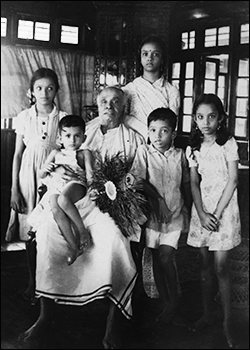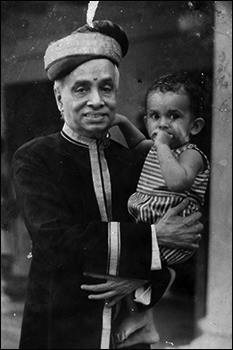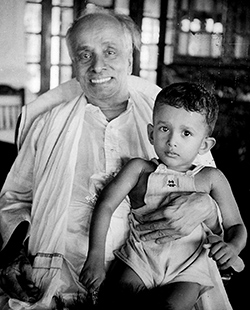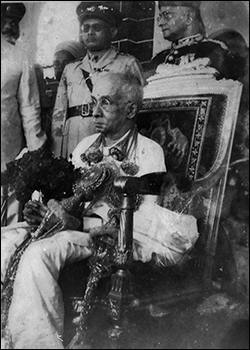He is the son of Ikku Thampuran of tavazhy two. The religious ceremonies connected with the installation of His Highness Sri Kerala Varma were conducted as usual in the historic Dutch palace at Mattanchery on the 18th March 1946 with the centuries old formalities and ceremonials.
At the Durbar that followed, a Proclamation was read by Lieutnant Colnel A.A Russel, M.C, Resident for the Madras States.
“ Where His Highness Sri Ravi Varma, the late Maharaja of Cochin departed this life at Tripunithura on the 31st January, 1946, corresponding to the 18th Makaram 1121 ME; his next cousin, The Elaya Raja Kerala Varma, who has been recognized by His Excellency the Viceroy on behalf of His Imperial Majesty the King Emperor as Lawful heir and successor, is accordingly proclaimed Maharaja of Cochin and the inhabitants of Cochin are hereby directed to acknowledge and obey him as the Maharaja and Ruler of the State.”
After congratulatory remarks the Resident continued..” We believe that there are great changes impending in India and whatever the future constitution may be, the Indian States will play their important part. They can and should wield considerable influence for the good of the country. In this, Cochin, under your Highness’s enlightened rule will, I am sure set a worthy example.”
The Mahraja responded thanking the British and added..” I have been called to this ancient Gadi at a critical time in History of this country and of the world. The war has ended in complete victory over His Majesty’s enemies; but it has left in its train a number of social, economic and political difficulties which so far as they affect my State I shall try my best to surmount. Not the least of our difficulties is in respect of good supplies , but with the continued co operation of my subjects and assistance from other parts of India , I am confident that we can meet them successfully.
“Anxious to associate my subjects more closely with the Government of the State, I have decided to appoint a second Minister and to transfer more departments of the State to the administration by a representative of the people. Details of these Constitutional reforms are being announced separately today. I also hope as soon as the Franchise committee now at work is completed its labours to be able to announce a liberal extension of the present franchise.”
The Constitutional Reforms can be summarized as follows:
The Maharaja gave a detailed history of the Cochin State Legislative Council which was inaugurated in 1925 and progressive changes have been made by various Maharajas before him. In June of 1938, his predecessor promulgated the Government of Cochin Act. He appointed for the first time the Minister for Rural Development and transferred to his care the departments of Public Health, Panchayats, Co-Operatives, Agriculture, and Ayurveds, uplift of depressed classes and development of cottageindustries. Since then,Rural Libraries, Land Mortgage Banks, Trade Schools, Village Courts and Vagrancy have also been placed in the hands of the Minister.
I now consider that to give practical effect to the wishes of my people, it is appropriate to appoint one more Minister. Besides the departments now under the care of the Minister, I propose to transfer to one or the other of the two ministers the following departments.
(1) Municipalities
(2) Medical
(3) Labor
(4) Registration and
(5) Anchal
It is my hope that ere long, it will be possible also to transfer the entire Education Department.”
It has always been against the traditions of my House to exercise power without restraint and in making the present announcement, I am only declaring once again the avowed policy of the Cochin Ruling House in this matter. This State along with the rest of India is passing through the difficulties of the post war period and I believe that the provision to associate my people to a greater extent than before in the administration of the State will help me and my Government to pass through these difficult days with greater ease.
The welfare of my people has been the constant care of myself and my predecessors and I hope that the administration of more subjects which touch the day to day life of my people by their accredited representatives will increase their prosperity and contentment.”
Kerala Varma was the first to obtain B.A degree among the Cochin Royal Family members and had an ambitious and even a rebel temperament. He very much wanted to get employed. However in the early decade of the 20th century, it was against the tradition for Princes to get employed. The then Maharaja did not want to break the tradition. More progressive and liberal minded brother of the then Maharaja , who was living in Irinjalakuda was Kerala Varma’s mentor. Kerala Varma wrote several letters to the British Resident G.T Mackenzie, I.C.S for help. But the British replied that they did not want to interfere with the Maharaja’s sentiments.
Kerala Varma even suggested to abdicate from his 9th Prince rank. ( IOR R/2/880/59).
He was the first to get employed as the Malayalam Translator in University of Madras. Later on he also held the post of Warden of the Residential Palace at Ernakulam. He married from the Pottayil Tharawad and had two daughters and several sons.
.jpg)
Seated to his right Acharya Kripalani and to his left is his grand daughter Devi and Mrs. Kripalani.

The Raja surrounded by 5 of his grandchildren
One of the sons was the late Madhava Menon, a renouned ENT Surgeon . The other son Gopala Menon functioned as his Sarvadhi Kariakar. After his wife’s death, he married again from the Paliath family and had a daughter and son.

The Raja with his grand son.

The Raja with his grand son.

The Raja on the throne in a pensive moment
Kerala Varma led the group of Junior Thampurans protesting against the usurpation of power by the consort and Sarvadhi Karyakar of the mentally disabled Raja Rama Varma ( 1914-1936) who died in Madras. He was a free thinker, always ready to travel the road less travelled. His pet idea of “ Unification of Kerala”was bound to be promoted at this uncertain juncture in the Indian political milieu
The Maharaja’s speech to The Cochin Legislative Council
29th July, 1946
“ The events of the past few months have brought grave issues to the forefront of Indian politics. The statements of the cabinet delegation and the Viceroy have raised hopes as well as misgivings in the people of this country and more especially so in the subjects of the Indian States. Important constitutional changes are envisaged by those statements and it is but natural that my subjects and the wider public of India should feel anxious to know my attitude towards these imminent reforms.
I have given deep consideration to these matters and have studied carefully the points of view put forward by various leaders of British India and the State. It is a consolation to know that the integrity of India is not to be broken up and in framing the future constitution of India, we can proceed on that basis. Personally I have always felt and nothing I have read these days has changed my view that the States are an integral part of India and should therefore act in unison with the British Indian provinces and for the benefit of the whole. For if India becomes great, every part of it becomes great and the States too derive the benefit and the glory.
It would seem that the scheme of linguistic provinces will be carried out. I am in full agreement with this principle. The people of Kerala are considerably agitated over the question of re distribution of Provinces. Unless a way is found to establish a united Kerala, the neighbouring districts of Malabar will find itself attached to a province where culturally it may have to remain a minority. It is good neither for the province nor for Malabar that it should be so. I have said before that if India becomes great, every part of it becomes great. It is equally true that if every part becomes cohesive and strong, it adds to the strength and greatness of India as a whole.
In this context of fateful events and impending changes, it has fallen to my lot to direct the destinies of my State. I can not do it dutifully unless I were to bear in mind the relation of my State and my subjects to rest of Kerala. My subjects are connected in so many intimate ways with the people of Malabar that it is no exaggeration to say that they are as perturbed by the changes foreshadowed above as the latter.
Studying the problem in this setting, I have arrived at the definite conclusion that Kerala must unite and be one if it were to save itself from cultural extinction. If we remain as we are, our voice in the future Union Government of India will never be heard. It will only be a faint and ineffective murmur. For its own sake and for the good of the country as a whole, Kerala must unite and function as a separate and cohesive unit in the greater Federation of India. In order to achieve this, Malabar, Cochin, and Travancore will have to join together and devise ways and means to frame a scheme of Government for the whole of Kerala without destroying the connection of the people to the ancient ruling houses. It appears to me that this is not difficult if we have the will and the heart to save the culture and integrity of Kerala which was, at one time being ruled by the common forbear of the ancient ruling families, the Cheraman Perumal.
Tradition says that the last Perumal in order to avoid internecine strife, divided his territory into three and enjoined the Zamorin and the Cochin and the Travancore rulers to administer their respective territories without electing a Perumal. If this is true, History cannot provide a more disastrous example of an ill advised injunction to subordinate Rulers by a Paramount Power. It was the beginning of our troubles. For the thousand years thereafter, we have reaped a harvest of misery and quarrels and nothing but that. Is it not time for us to redeem our ancient land from the parlous state into which it has sunk since the abolition of the institution of Perumalship? Here is a golden opportunity for us. Another Paramount Power is relinquishing power with the sage advice to unite and be strong. We have, I hope, learned wisdom from our past miseries. We can still get inspiration from our historic past if we care to seek it there. With suitable modifications to fit modern political conceptions, the institution of the Perumal can be revived and a link with the proud historic past forged. The idea thrills me as it should every Malayalee. There were in those days many an institution in the polity of Malabar worthy of copying today because of the democratic principles on which they were based.
For my part therefore, and speaking for my State, I am prepared, indeed I earnestly desire to combine with Malabar and Travancore in order to form the Provence of Kerala. This does not mean that the functions of my Family are abdicated; but necessarily they have to be modified to suit new circumstances. I believe in pure Constitutional Rule and throughout my life I have sedulously cultivated an attitude towards life and institutions which is antipathetic to autocracy and personal rule. Constitutional Rule has been the guiding principle of y Family and more especially so of my immediate predecessor, and in return we have had and I am having the loyalty and love of my subjects in an unstinted measure. I am sure that in future too this traditional attachment of my subjects to my Family will never wane.
With these ideas in view and in order to ascertain how far my desire to bring into existence a Kerala Province will be shared or supported by the people of Malabar and the progressive Ruler of Travancore, I have asked my Dewan to initiate discussions with the Government of Madras and with the Travancore Durbar. These talks and discussions obviously will have to precede the meeting of the final Constituent Assembly.
The only other point remaining to be considered is about the Constituent Assembly and the representation of Cochin in it. It has not been settled yet how many representatives Cochin could send to this assembly. However to set at rest all doubts about the method of representation, I am glad to announce that, after mature consideration, I have decided to allow the people to elect their representative or representatives. This election will be by the council, but in the case of British Indian Provinces, the candidates may be chosen from anywhere and they need not be members of the council. I hope the members will not allow petty motives and party squabbles to influence them in the selection of our representative or representatives. I have been watching the party politics of the State with great disappointment. The bewildering changes of party label by members of the Council show a lack of political education and laxity of principles, which auger ill for the future. Let me hope it is a passing phase. I am entrusting a grave responsibility to you in the firm belief that in your hands the prestige of my Family will e safe and that you will not do anything which will undermine the ultimate Constitutional Headship of y Dynasty. There need not be any conflict between a Constitutional Ruler and its subjects. There is a lot which you and I can learn from the English. You may hate British Imperialism but a sober Englishman is a subject worthy of study and his lack of political fads and fancies is worthy of copying if we want to build up strength.
Let me close this statement. I know the anxiety with which many of you have been awaiting it. I believe that I have largely expressed sentiments which will find an echo in your hearts. It is not all generation of men who get an opportunity to render service of such magnitude to their country and people. To those of you who are young, here is the chance to forget self and work with united effort for the good of Kerala and India. It is worth striving for and achieving. You have still a future before you and if success attends our efforts, you can honourably and happily live a life whose pattern you will have designed and constructed yourselves. To Those of us who are old, it is a great satisfaction to know that we are helping to build a future for Kerala and India which will inure to the benefit of posterity and the greatness of our country. Or myself, I thank God for vouchsafing me the opportunity to serve my people and my country in a manner which I hope will ultimately add to their strength and glory. I don’t seek any reward except the fulfilment of the dream that I have been cherishing all these years – the UNIFICATION OF KERALA. That is all. May God bless our efforts.”
This message from the Maharaja given without prior consultation with the British and Travancore authorities caused great concern and consternation in Trivandrum and within the British circle. Sir George Boarg, the Dewan of Cochin said that he did his best to persuade the Maharaja to let Madras and Travancore have previous advice of his intention; but His Highness was insistent that the message must be delivered at once. The Travancore Government were forced to announce publicly and immediately their complete repudiation of the Maharaja of Cochin’s plan. Travancore State had 2 million of its population who were Tamil speaking and precipitated adjournment motions in the Travancore Legislative Council by Tamil speaking embers. This had a mixed reception in the press, depending on the political views of the newspapers concerned. But since so many of the British Indian politicians are ready to welcome anything that may lead to the extinction of the Indian States, the reaction was generally favourable.
Mr. C.G.N Edwards from the Resident’s office in Trivandrum summed up the situation in the two states thus:
“ In Travancore, Dewan C.P Ramaswamy Iyer deprecated the introduction of full responsible Government in the India States and advocates a democratic constitution with a fixed executive on the American rather than on the British model, on the lines of what has been provided in the new constitution for Travancore. He would like all Indian States to accept this principle and call a halt to what he regards as the rapid downward slide towards full responsible Government of the Westminister pattern...
Cochin on the other hand feel that rightly or wrongly, they have started on the road to responsible Government, that there can be no going back and that the only question now is the pace of the advance ( or what C.P would call the landslide ). His Highness, the Maharaja of Cochin has in fact quite definitely made up his mind that his only proper course now is to grant his people full responsible Government at the earliest...”
Bombay Chronicle questioned whether Travancore will take the same view soon. Sir C.P Ramaswamy Iyer , the Dewan, states that the Government of Travancore “ –can not possibly agree to an administrative union with Cochin and the British Indian province of Malabar”. A similar view would have been expressed by the Government of Cochin few years or months ago. But the people are moving fast towards rational administration – The Cochin Statement is itself indicative of that trend – and the people who maintain the administration ought to have and will have the final say.
The Indian Express, Madras, under the title “ Illuminating argument” opined that Kerala must unite and be one if it were to save itself from cultural extinction. The paper applauded the Ruler of an Indian State like the Maharaja of Cochin who stands to lose materially if the change envisaged courageously advocating the cause of the united Kerala comes to pass. The Maharaja’s declaration is opportune as it is unequivocal – it required extra ordinary courage on the part of His Highness to broach the subject to all. But intense patriotism transcending personal values, a consciousness of the tremendous changes occurring in India and a deep sense of duty to his own people have emboldened him to the right thing at the right moment. If past experience is any guide to future behaviour, the editorial said, we have no reason to think that the ruling house of Travancore will be less patriotic than the Ruling house of Cochin. And against this background, we are tempted to dismiss the Travancore Dewan’s dissent as temperamental rather than reasoned.
Pandit Jawaharlal Nehru: “ Some days ago, I read a declaration made by the Maharaja of Cochin on responsible Government in his State. The whole outlook and approach of this declaration was in pleasant contrast to what one usually gets from the Ruler and authorities in the States, and I should like to congratulate the Maharaja. I hope he will give full effect to it as early as possible, and thus give Cochin pride of place in the Indian States. In that work, I am sure, he will have the full co operation of the States people’s organization. Cochin is eminently suited for this changeover to a democratic form of Government because of the high standard of education here.”
C. Rajagopalachari, Government of India: “ The announcement of His Highness, the Maharaja of Cochin will be most deeply appreciated throughout India. The boldness of its conception and the Statesmanship behind it will enhance the prestige of all the Princes in India – The adverse comments of Sir C.P Ramaswamy Iyer, the Dewan of Travancore only serve to bring out the far sighted greatness and self-abnegation that mark the Cochin Ruler’s historic message to his legislative council.”
Many other prominent politicians and freedom struggle leaders and writers showered Maharaja Kerala Varma with compliments.
On 9th September 1946, His Highness transferred all subjects ( portfolios) except Finance, Law and order, and Devaswom to popular ministers and increased the number of ministers from two to four. On 14th August 1947, a day before India became independent from Colonial British rule, His Highness announced his intention to transfer all subjects ( portfolios) to popular ministers except Palace, Devaswoms, Police, jail, and State Forces. This announcement was implemented by the promulgation of ACT 1 of 1123. A main feature of this was the termination of the position of the Dewan in the framework of the Cochin constitution. The Dewanship of Cochin thus disappeared on September 1st, 1947, the last Dewan being Dewan Bahadur C.P Karunakara Menon. His Highness granted a further extension of franchise and introduced adult franchise on 12th May 1948 and amended the Government of Cochin Act designating the Cochin Legislative Council as the Legislative assembly, increasing the elected strength from 38 to 53, the total strength of the house being 58.
After an illustrious and eventful regime of nearly two and a half years, His Highness breathed his last on 8th July 1948 to be succeeded by his cousin His Highness Shri Rama Varma Pareekshith Thampuran.
.jpg)



